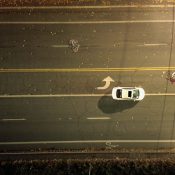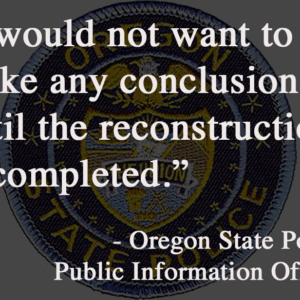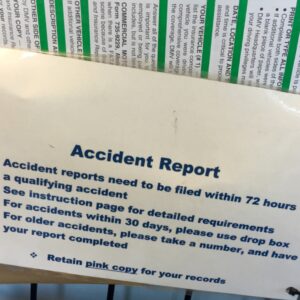Smart transportation reform advocates know words matter. If we think of thousands of driving-related deaths and injuries as being the result of tragic “accidents”, we’ll never build the social urgency necessary to combat its root causes.
Despite years of activists pushing the “crash not accident” agenda, much of the media, pundit class, elected officials and other policymakers still say “accident.” Some say this issue is only something diehard activists care about.
Now those activists include a major driving advocacy group. In a press release issued on January 12th, the AAA-Auto Club Group said they will no longer use “accident” in their official communications. “In the New Year, save lives by changing how you talk about tragedies,” the statement urged.
Advertisement
Note that Auto Club Group (ACG) is not the same as the American Automobile Association (AAA). The AAA is a federation of auto clubs with 60 million members nationwide. ACG is one of those clubs, the second largest in the country, which counts 14 states and about 14 million drivers among its membership.
Even so, this is wonderful news.
In their statement, AAA-ACG says, “The language we use to think about and describe things affects the value judgments we make about acceptable behavior, and as a result, the way that we behave.”
Here’s more:
When we call a crash, collision, or wreck an “accident,” we imply that these tragedies are inevitable, and that they’re beyond human influence or control… When it comes to traffic crashes, nothing could be further from the truth.Crashes aren’t accidents, and they don’t have to be an inevitable, acceptable fact of life.
In 2021, let’s change our language to reflect the fact that traffic crashes aren’t something that just happen. They’re something we control. They’re a problem we can solve. Accidents happen, but most crashes don’t have to.
When a plane crashes, we don’t call it an ’accident’ – in large part because we demand answers, and that it doesn’t happen again,” said Nick Jarmusz, director of public affairs for AAA – The Auto Club Group. “In 2021, let’s change our language to reflect the fact that car crashes aren’t something that just happen. They’re something we control. They’re a problem we can solve. Accidents happen, but most crashes don’t have to.”
Advertisement
Before posting about this, I spoke to Adrienne Woodland a spokesperson for AAA-The Auto Club Group in Michigan. She clarified that the statement was made available all 14 of their member states and other territories which include: Colorado, Florida, Georgia, Iowa, Michigan, Nebraska, North Carolina, North Dakota, South Carolina, Tennessee, Wisconsin, Puerto Rico, the U.S. Virgin Islands, most of Illinois and Minnesota, a portion of Indiana, and the province of Quebec.
Not all ACG chapters have adopted and broadcast the statement. We can confirm that it has been shared so far by Michigan, Colorado, Illinois and Wisconsin. And not every state shared the full statement. Some urged members to take the Crash Not Accident Pledge (a campaign created by New York City nonprofit Transportation Alternatives in 2015), others didn’t. And not everyone shared that part about plane crashes.
Our local chapter, AAA Oregon & Idaho has not released a similar pledge. We’ve reached to them and will report back what we hear.
They should. And not just because a fellow AAA club has taken the leap. Let’s not forget that even the National Highway Transportation Safety Administration stopped using “accident” in 1997. And several states and cities have erased “accident” from all policies and communications. And in 2016 the Associated Press got on board.
Hopefully this gets the ball rolling. It would be a major step forward if every state chapter in the U.S. would adopt this statement and make the “crash not accident” ethos an official part of their work.
— Jonathan Maus: (503) 706-8804, @jonathan_maus on Twitter and jonathan@bikeportland.org
— Get our headlines delivered to your inbox.
— Support this independent community media outlet with a one-time contribution or monthly subscription.








Thanks for reading.
BikePortland has served this community with independent community journalism since 2005. We rely on subscriptions from readers like you to survive. Your financial support is vital in keeping this valuable resource alive and well.
Please subscribe today to strengthen and expand our work.
Great news! – though this needed to be done 10+ years ago (my 2 cents). And by AAA too!! It’s been on the traffic safety punch list for 30 years.
In related news: the State of Hawaii Legislature is considering making a similar ‘adminstrative’ update to its use o the word accident vs collision, see SB151
https://www.capitol.hawaii.gov/session2021/bills/SB151_.HTM
Fun fact; in Oz, the word for crash is smash. I LOL’d the first time I saw a “smash repair” shop sign.
Though, ‘collision’ is a greatly sanitized word and shouldn’t be lauded.
True for smash repair shops. However, there are plenty of people in Australia calling motor vehicles collisions “accidents”, or the short hand “MVA” (motor vehicle accident). I prefer the terms collision or crash because they are neutral in terms of culpability. Unless there is a clear violation of the law (like DUI, bald tires, no brakes etc.) there is no need to assign culpability at the scene, or in press reports immediately afterwards. Assigning culpability for a traffic collision is the job of courts, notwithstanding that insurers will often do that work if they feel that culpability/liability is apparent.
“Accident” does not assign or deny responsibility. It speaks only to intentionality. There are many examples where we use the word “accident” where the casual chain is obvious, the outcome predictable, and responsibility unambiguous.
My guess is that “some” is the vast majority of people. I take this position myself, and frankly I’d never even heard of anyone taking exception to the term until I came into contact with urban transpo activists.
I still have yet to meet anyone who finds the term inappropriate that hasn’t had considerable contact with someone who does.
Where does this logic comes from? As long as I can remember, we have always been taught that the vast majority of accidents — traffic and otherwise — are avoidable. In what other area of life other than transpo activism are accidents not understood to be influenced by intention, and therefore control?
Accidents require the possibility of intention and therefore the involvement of a sentient being like a human. Crashes are not subject to this limitation. An intentionally caused crash is never an accident nor is an event that was not influenced by a decision of some kind. Not all crashes are accidents, not all accidents are crashes, and even when either term could be applied, one is often better than the other.
The only thing trying to literally put words in other peoples’ mouths does is create distance with those who need to be reached. I don’t know if AAA kowtowed to activist complaints or the decisionmakers are themselves activists, but the universal reaction I’ve encountered from people who have no activist connections when they hear you shouldn’t use the word “accident” is “That’s stupid.”
This only provokes anti PC backlash, and then people are that much less likely to listen when you have a good idea. That NHTSA and other entities have stopped using the word doesn’t make it inappropriate elsewhere. Intention doesn’t factor into the types of things they report on.
Going after the windshield perspective in reporting that presumes fault of the nondriver makes sense — and it also makes sense to those who unintentionally do it when they get called out.
Oh, Kyle – you’re such a contrarian.
The word “accident” clearly allows vehicle operators to say, and think, “I didn’t mean to do it so I’m not responsible for the consequences.” That kind of thinking has huge implications for behavior – the way people actually behave when they drive.
If you’ve ever had driver-trainees in your family (sounds like you haven’t), you’d know how hard it is to pound this idea into young people’s heads. So many of them see driving as some kind of wheeze – a path to unlimited fun and freedom (which of course advertising promotes endlessly) – that you have to practically beat into them the idea that driving is a serious, life-threatening endeavor. Worrying that people will find our language un-PC is the least of our worries.
I think it is safe to say that in the vast vast majority of cases, the driver didn’t mean to crash. If intentionality affected culpability, we wouldn’t need liability law.
I have never heard that logic expressed anywhere but here. Except for on BP, no one is confused about this stuff. But then again, I do see some consistency since suggesting cyclists have any responsibility for their own safety here is reliably met with howls of protest.
If you think it’s so hard to pound things into young peoples’ skulls (and I agree that’s the case), how does trying to force language that no one else uses help? And as far as driver training goes, I don’t know how they do it now, but we spent loads of time watching all kind of flicks — the Red Asphalt series is famous with real gore, real people suffering, we had police photos showing disemboweled an dismembered people, and got lectured heavily.
Is your position that trying to force people to say particular words will somehow transform their thinking? That they won’t tune you out or do the exact opposite that you want to yank your chain just because your logic is totally bonkers to most people?
Does anyone remember the sign in Beaverton that said, “There are no accidents – only bad choices”?
It was on a residential street near the path between SW Chestnut and SW 5th. It must have been a homemade sign and it’s gone now, but that sign should be on every roadway in America.
An “accident” is when my elderly dog or cat is caught short and has to urinate somewhere s/he shouldn’t – there is nothing the cat, dog or I could do to prevent this in most circumstances. Motor vehicle collisions are mostly avoidable by: only driving sober, driving at a safe speed (but not faster than the speed limit), being aware of non-motorized road users (including pedestrians and cyclists) especially at crossings (whether marked or unmarked) and ensuring that your motorized vehicle is in a safe operating condition.
I drive a decent amount (about 12,000 miles per year), but have not collided with another vehicle or road user, ever, despite the worst efforts of some other drivers running red lights and driving at dangerous speeds or in an erratic manner that made me think they were intoxicated.
Red Electric Trail?
Great news!